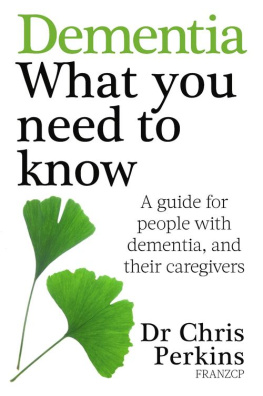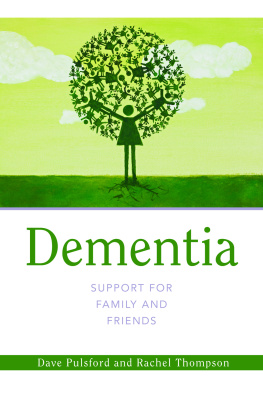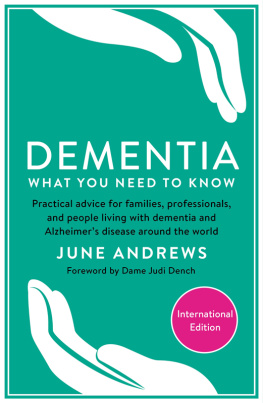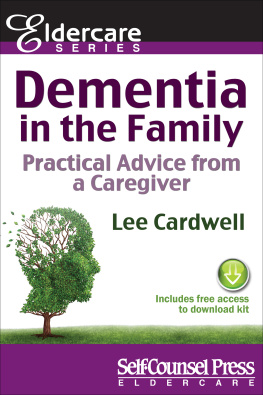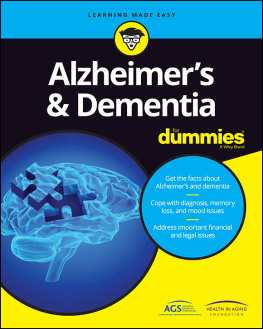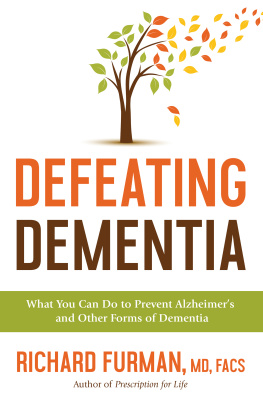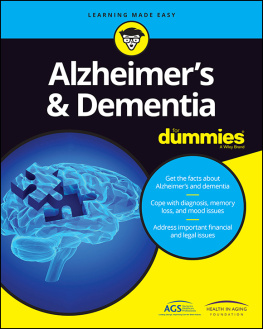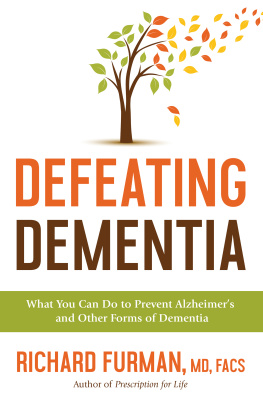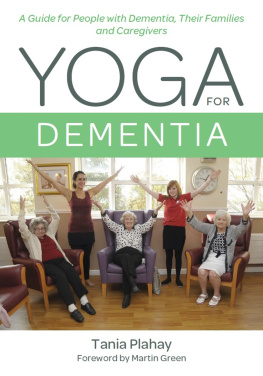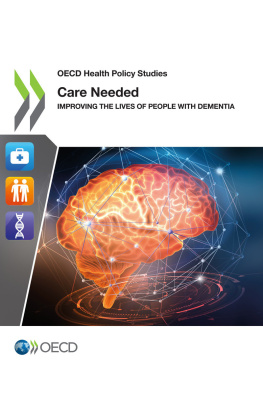Dementia: What you need to know has been written for people with dementia, and their caregivers, to help them understand and come to terms with this illness, and to cope with the changes that occur as it takes its course.
This expert book explains what dementia is, the different forms it takes, how and where to get help, diagnostic tests, treatment and medication, and the services available. It examines the issues involved in caring for a sufferer at home and, when the time comes, in choosing residential care.
Dr Chris Perkins aims to help caregivers at all levels deal with sufferers with acceptance and compassion, and offer humane and respectful care to people with dementia.
Super-comprehensive
NORTH & SOUTH
Anyone concerned with dementia will find help and reassurance from this timely book which takes a matter of fact approach and will answer most questions.
THE CHRISTCHURCH PRESS
Dr Chris Perkins (FRANZCP) trained at Otago Medical School and then worked as a GP in Wellington and Thames, before training in psychiatry in Hamilton and Auckland. Since qualifying she has worked mainly in old-age psychiatry, in both the public and private sectors.
Contents
To my mothers, Joan Arnold and Nance Perkins
Alzheimers is one of the words that has infiltrated our consciousness over the past decade. Along with other forms of dementia, Alzheimers has become part of everyday conversation and concern. As life-spans lengthen, so the numbers afflicted by dementia will increase from 35.6 million in the world in 2010 to 65.7 million by 2050. There are few of us who do not know someone with the condition, often a close relative whose loss of mental capacity is distressing to them as well as to family and friends.
But here is a book that will assist both the person with dementia and the caregiver. Life situations are always more difficult to handle in the absence of information and understanding. What is scary in the dark becomes less so when the light goes on. Chris Perkins sheds light on many aspects of dementia in this practical and compassionate book.
Understanding the nature and processes of dementia is an important start. Recognising different forms, and distinguishing it from other conditions, is an important preliminary diagnostic tool. To know the path it is likely to take is helpful in preparing for the future.
Despite common belief, the condition is not totally untreatable. Two chapters describe both medical forms of treatment and a variety of supplementary therapies that are available massage and music, acupuncture and diet, herbal remedies and homeopathy, to name just a few. These options temper realism with hope for both the person with dementia and those who stand by.
The author deals with options for care, both residential care and care at home for the 70 per cent of people with dementia who remain in their own homes. One of the most difficult dynamics is when a caregiver has to decide when residential care is necessary, even on an intermittent basis. There is a natural sense of guilt in feeling one has failed to fully support an ageing parent. Yet the reality is that caregivers also need a break in order to care for themselves, and ultimately to be better able to care for their family member because of that.
This book explores the key topic of how one communicates with people with dementia about their condition so that a healthy and liberating transparency characterises the relationship. The discussion surrounding the tricky question of how to persuade someone to give up driving has application not just for those with Alzheimers.
Later in the book an innovative chapter deals with the spiritual and cultural dimensions of care. In an age preoccupied with fiscal and technical criteria, it is refreshing to find attention given to those immeasurable dimensions of life that nourish the human soul. The pluralistic nature of Western society today calls for an approach that is inclusive of the spectrum of religious and non-religious spiritualities that make up our colourful communities. The author provides this with abundance.
I have known Chris Perkins for 35 years. She writes from her extensive experience as a medical professional, her own fully developed spirituality, and her deep compassion and practical wisdom. This is a book that will meet a market hungry for insights and help with a condition that leaves no family untouched. It is a pleasure to commend it as a new and accessible resource with universal appeal.
Richard Randerson
(Richard Randerson is a former Chair of the Board of the Selwyn Foundation and former Dean of Auckland Cathedral)
Some of the chapters in this book were written while I was in England in 2002. I would like to thank the staff of Sedgefield Community Hospital in County Durham for giving me the opportunity to practise in a different system with alternative approaches to dementia. I am also most grateful to Dr Alan Swann of Newcastle General Hospital in Newcastle-upon-Tyne who introduced me to all sorts of innovative ways of caring for people with dementia.
Many people have been most generous with their time, encouragement, enthusiasm and hard work in assisting in the writing of this book. Various colleagues of many disciplines read drafts and put me back on the right track when I had left it. Marie Israel, Cathy Fergusson, Margaret Wilson and Marie Todd read through the first chapters. Richard Worrall helped with behavioural and psychological symptoms, and Marion Gray with treatment. Chris Collins gave input on the caregiving chapters as did Margaret Wilson and Greg Young. John MacMillan, Bev Blake and the Counties-Manukau NASC (Needs Assessment and Service Coordination) team helped sort out the intricacies of assessment, funding and service coordination. Verna Schofield, Pat Astley, Tina Chivers, Judy Binns and Richard Worrall assisted with the residential care chapters. Bruce Connors taught me about music and art therapy. Marie Todd and Janet Turnbull contributed their expertise on geriatrics to the chapters on the final stages of the life of people with dementia. Brian Emery, Tom Rickit, Eliza Snelgar, Linda Thomson, Dr Sunita Paul, Indu Bajaj and Teuutu Pomee helped with the cultural aspects. Jean McCormick and Sue Martin reviewed the legal chapter. Stephen Jacobs spent time discussing dementia and loaded me up with information and reports. Gwendoline Smith inspired me and gave advice on the writing of books as well as sharing her own experience of coping with a loved family member with dementia. My grateful thanks to all these people. Matthew Croucher and the people at Alzheimers Christchurch gave useful feedback on the early editions.
My lay readers sister Shirley Baddington and friends Pam Collinge and Linda, and my husband Rod let me know when my language was too pompous, too medical or just confusing.
Barbara Smith was a wonderful support. She is an ex-caregiver to her mother with dementia, a nurse in an elderly care facility and the holder of a degree in English literature; I could not have found a more useful person to critique the drafts.
Most of all, I want to thank Jenny Taylor and her daughter Debbie, Lynley Mahon and the Wrights, who spoke frankly and movingly about their experiences of caregiving. Their stories, throughout, have added life and hope to what otherwise might be a depressing topic. I hope their bravery shines through.
I have learned most, of course, from my patients. I am truly humbled by their courage, cheerfulness and openness. I have nothing but admiration for their caregivers, who find meaning in tragic situations and continue to love and laugh regardless.
Alzheimers, dementia, senility These words strike terror into the hearts of older people who have misplaced keys or forgotten the name of the person in front of them. Instantly they see their loss of memory progressing to loss of identity and total dependence on others. Losing our mind means losing our selves, our dignity, our meaning and purpose and our ability to contribute. No wonder older people often say that developing dementia is their biggest worry, and the families of the person say, It would have been better if he had cancer.

